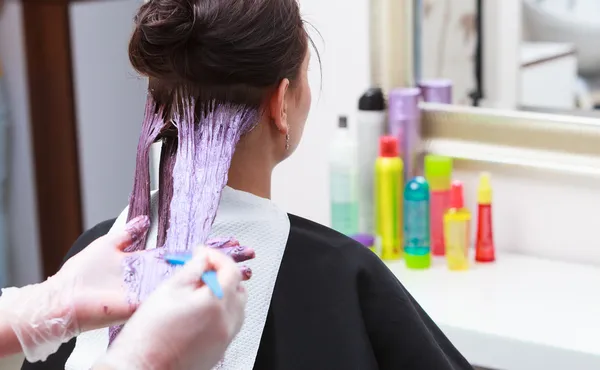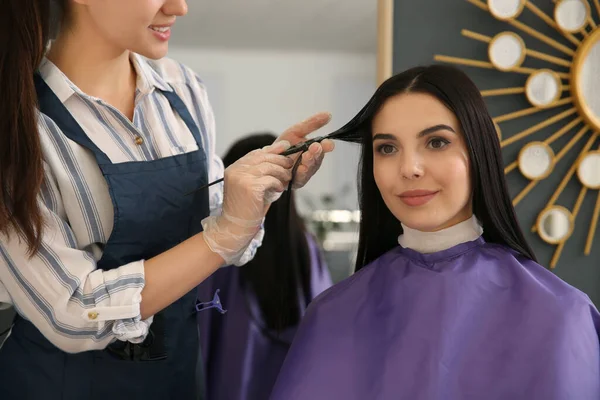The world of haircare and style is constantly evolving, with individuals often seeking vibrant new looks through hair dye. However, amidst the quest for self-expression and beauty, concerns often arise regarding the impact of hair dye on hair health. A common question that looms is, Does Dying Hair Cause Hair Loss? In this comprehensive exploration, we unravel the intricate relationship between hair dye and hair loss, shedding light on the science behind it, and offering guidance on maintaining a healthy mane.

Understanding the Dyeing Process
Before delving into the possible links between dye and hair loss, it’s essential to comprehend how hair dye works. Hair dye contains chemical compounds that alter the color of the hair. The two primary types of hair dye are:
- Permanent Hair Dye: This type of dye penetrates the hair shaft and changes the color permanently. It involves the use of ammonia and hydrogen peroxide to open the hair cuticle and deposit color molecules deep within.
- Semi-Permanent Hair Dye: These dyes are less damaging as they do not penetrate the hair shaft as deeply. They gradually fade with each wash.
The Science Behind Hair Dye and Hair Loss
The primary concern regarding hair dye and hair loss stems from the potential damage inflicted on hair follicles during the dyeing process. Here’s a closer look at how hair dye can impact hair health:
- Chemical Damage: The harsh chemicals present in permanent hair dyes can weaken the hair shaft, making it more prone to breakage. This breakage can manifest as hair loss over time.
- Scalp Irritation: Hair dye can sometimes irritate the scalp, leading to inflammation. Prolonged inflammation may affect hair follicles and contribute to hair loss.
- Allergic Reactions: Some individuals may experience allergic reactions to hair dye, leading to scalp itching and hair loss in severe cases.
- Excessive Heat: The use of heat during the dyeing process, such as with hot irons or dryers, can further damage hair and exacerbate hair loss.
You may also like | List of The Best Treadmills Brands In the United States for Home Use
Temporary Hair Loss vs. Permanent Hair Loss
It’s essential to distinguish between temporary hair loss and permanent hair loss related to hair dye:
- Temporary Hair Loss: Some individuals may experience temporary hair shedding shortly after dyeing their hair. This can be attributed to the stress the hair shaft undergoes during the dyeing process. However, this type of hair loss is typically reversible, and hair regrowth occurs once the hair follicles recover.
- Permanent Hair Loss: In rare cases, hair dye-related hair loss can be more severe and potentially permanent. This is more likely to occur if there is extensive damage to the hair shaft and hair follicles.
Minimizing the Risk of Hair Loss from Dye
While the risk of hair loss from dye exists, there are steps you can take to minimize this risk and maintain the health of your hair:
- Choose Professional Products: Opt for high-quality, professional hair dyes that are less likely to contain harsh chemicals.
- Do a Patch Test: Before dyeing your entire head, perform a patch test to check for allergic reactions or scalp irritation.
- Follow Instructions: Always follow the manufacturer’s instructions when applying hair dye, including recommended waiting times and rinsing thoroughly.
- Limit Frequency: Avoid excessive dyeing and give your hair time to recover between sessions. Consider semi-permanent dyes or alternatives like henna for a milder option.
- Condition Regularly: Use deep-conditioning treatments to nourish and strengthen your hair after dyeing.
- Avoid Heat: Minimize the use of heat styling tools after dyeing to reduce further damage.
- Consult a Professional: If you have concerns about hair loss or scalp health, consult a hair care professional or dermatologist for guidance and evaluation.
It is important to note that hair loss is a complex condition with many possible causes. Hair dye is just one potential factor that could contribute to hair loss. If you are concerned about hair loss, it is important to talk to your doctor or dermatologist. They can help you to determine the underlying cause of your hair loss and recommend appropriate treatment options.
Here are some tips for reducing the risk of hair loss from hair dye:
- Choose a hair dye that is gentle and does not contain harsh chemicals.
- Do a patch test on a small area of your skin before using a new hair dye to check for an allergic reaction.
- Apply hair dye to your hair carefully and avoid getting it on your scalp.
- Do not leave hair dye on your hair for longer than the recommended amount of time.
- Rinse your hair thoroughly after using hair dye.
- Use a conditioner after dyeing your hair to help repair and protect your hair.
If you are experiencing hair loss after using hair dye, it is important to stop using the hair dye and talk to your doctor or dermatologist. They can help you to determine the best course of action.
Conclusion: Balancing Beauty and Hair Health
The question, Does Dying Hair Cause Hair Loss?, warrants a nuanced understanding. While hair dye can potentially contribute to hair loss, it’s often a temporary and reversible effect. By making informed choices, using quality products, and taking proper care of your hair and scalp, you can strike a balance between achieving the look you desire and maintaining the health of your hair. Remember, healthy hair is beautiful hair, and with the right approach, you can enjoy vibrant, dyed locks without compromising your mane’s vitality.
FAQs
Q: What should I do if I experience hair loss after using hair dye?
A: If you are experiencing hair loss after using hair dye, it is important to stop using the hair dye and talk to your doctor or dermatologist. They can help you to determine the best course of action.
Additional tips:
- Avoid dying your hair too often.
- Get your hair trimmed regularly to remove split ends and damaged hair.
- Use a deep conditioner once a week to help hydrate and strengthen your hair.
- Eat a healthy diet and get enough sleep.
Q: What are the possible ways in which hair dye could contribute to hair loss?
A: Some of the possible ways in which hair dye could contribute to hair loss include:
- Chemical damage: Hair dye contains chemicals that can damage the hair shaft and hair follicles. This damage can lead to hair breakage and hair loss.
- Allergic reaction: Some people are allergic to the ingredients in hair dye. An allergic reaction to hair dye can cause inflammation of the scalp, which can lead to hair loss.
- Scalp irritation: Hair dye can irritate the scalp. This irritation can lead to scratching and other behaviors that can damage the hair follicles and lead to hair loss.
Don’t miss | PCOS Hair Loss Treatment: Symptoms and Causes
Last Updated on September 19, 2023 by 247 News Around The World






